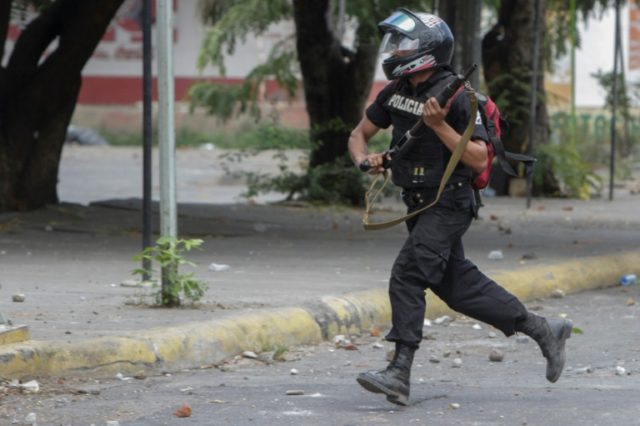Managua (AFP) – Two protesters and a policeman were killed in Nicaragua’s capital Managua after demonstrations over pension reform turned violent in the most significant protests in President Daniel Ortega’s 11 years in office, officials said Friday.
The demonstrations rocked the capital and nearby cities for a third day in a row with marches against a new law, which increases employer and employee contributions but decreases the overall pension amount by five percent.
“We are against these reforms, which means we’re against this government taking from the pockets of Nicaraguans,” exclaimed Juan Bautista.
He said riot police brutally attacked demonstrators like him because “the dictator does not like people to protest.”
A woman nearby shouted: “The people are tired of this repression!”
Students from Polytechnic University (UPOLI) have been holed up on their campus since Thursday evading police. Other students took refuge in nearby buildings or residences.
In Las Colinas, south of the capital, demonstrators raised small barricades and with their hands raised asked the riot police not to suppress them.
Four independent television outlets were taken off the air after they broadcast the demonstrations on Thursday, and two were still in the dark Friday.
The wave of protests that began on Wednesday has left at least three people dead — two young protesters and a male police officer, according to the government’s official spokesperson, Vice President and First Lady Rosario Murillo.
– ‘Vampires demanding blood’ –
Murillo compared the protesters to “vampires demanding blood to feed their political agenda.”
Two other civilians suffered bullet wounds, according to police. The opposition said more than 20 people were wounded.
The writers group Pen Nicaragua said that at least 11 journalists were attacked while covering the demonstrations.
“We call on the Nicaraguan authorities to act to prevent further attacks on demonstrators and on the media,” said Liz Throssell, spokeswoman for the Office of the United Nations High Commissioner for Human Rights.”
She urged the Nicaraguan government to let its people “exercise their right to freedom of expression and to peaceful assembly and association,” and urged protesters to demonstrate “peacefully.”
She also noted that demonstrators were “attacked” by government supporters in the city of Masaya.
Miguel Mora, director of the private television channel 100% Noticias — which the government blocked — accused Ortega of applying the same censorship he imposed in the 1980s during the Sandinista Revolution.
When Ortega returned to power in 2007 he promised to “never censor a media outlet — and today he is doing just that,” Mora told Channel 14.

COMMENTS
Please let us know if you're having issues with commenting.